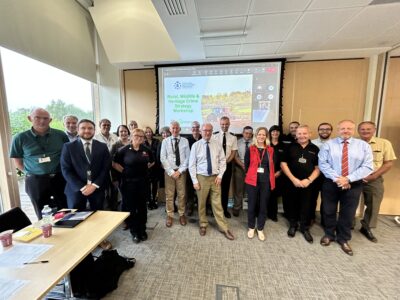
Warwickshire Police and Crime Commissioner Philip Seccombe with the delegates at the workshop
The impact of organised crime gangs and the hidden consequences global conflict has on the UK’s rural communities were exposed in a special workshop in Warwickshire, hosted by the county’s Police and Crime Commissioner, Philip Seccombe and Warwickshire Police’s Rural Crime Team.
Experts from across policing, rural, wildlife and heritage crime joined with representatives of the local farming community to explore the challenges being faced in rural areas and discuss ways to combat them.
With organised crime groups (OCGs) increasingly targeting rural communities, the event spotlighted cutting-edge solutions and reinforced Warwickshire’s position as a national leader in rural, wildlife and heritage crime prevention.
Amongst the delegates gathering at the National Farmer’s Union (NFU) headquarters in Stoneleigh on August 8 were representatives from the police National Rural Crime and National Wildlife Crime Units, the Environment Agency, Historic England, plus county and local community safety partners. They were joined by sector organisations such as the National Rural Crime Network, NFU, Country Land and Business Association, Angling Trust, British Horse Society, alongside academics from Durham University and Harper Adams University.
The workshop featured a series of presentations and discussions from the delegates, who commended Warwickshire’s current strategies as a model of best practice, while also identifying areas for further improvement.
A significant portion of the discussion focused on the increasing involvement of organised crime groups in rural crime. Attendees highlighted how OCGs, often with international links, are driving the theft of agricultural machinery, livestock, and even sophisticated equipment such as GPS units. These are then trafficked across borders, sometimes for use by foreign states in military conflict or put on sale in the black markets which have arisen as a consequence of international sanctions.
Similar forces are driving modern slavery and human trafficking in rural areas and the workshop underscored the critical need for cross-border collaboration and intelligence-sharing to combat these sophisticated criminal networks effectively. The utilisation of technology, such as Rural Automatic Number Plate Recognition (ANPR) and other digital tools, was identified as crucial in tracking and disrupting these activities.
Participants discussed the broader implications of rural crime and anti-social behaviour on farming communities, with particular concerns raised about under-reporting and the need for more robust rural crime reporting mechanisms. The importance of digital tools, such as WhatsApp, for better communication and self-education amongst rural communities was also highlighted, with some describing such tools as “game changers” in tackling rural crime.
The risk posed to Warwickshire’s heritage assets, which include a significant number of protected sites, was another major focus of the workshop. More accurate recording of heritage crimes and the expansion of Heritage Watch initiatives were identified as important to safeguarding these invaluable assets.
The event concluded with a plenary discussion, where participants agreed on the need for updated legislation and stronger powers to address persistent issues such as fly-tipping and modern slavery in rural areas. Delegates underscored the critical role of education and community engagement in preventing rural crime and preserving Warwickshire’s rural landscapes and heritage.
Mr Seccombe closed the event by reaffirming his commitment to rural crime prevention. “As vice-chair of the National Rural Crime Network and a strong supporter of the work Warwickshire Police’s Rural Crime Team has been undertaking with our county partners, it was heartening to hear our current approach described as best practice by sector experts. However, there is no room for complacency and we are determined to build on our successes and continue leading the way in rural crime prevention.
“By working closely with our communities and partners and through better use of technology, we want to get one step ahead of the criminals and stay there, helping to ensure that Warwickshire remains a safe place for all who live and work here.”
Carol Cotterill from the Warwickshire Police Rural Crime Team said “This was a really proactive and informative meeting with input from a large range of key partners and organisations that we work with.
“It was pleasing to note the positive comments regarding the work of the Rural Crime Team and the difference that has been made since being set up in October 2019. There are however ongoing and new demands that we continue to address, with Warwickshire Police committed to tackling rural crime and dealing with the offenders that target our farms and rural communities.”
The insights and feedback gathered during the workshop will play a key role in shaping the new Police and Crime Plan currently under development by the Police and Crime Commissioner, which will continue to place a particular emphasis on rural, wildlife and heritage crime.

